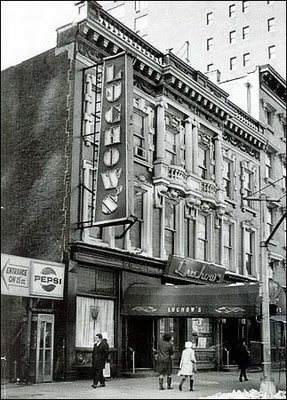
Tuesday, April 21
Every day I get up, make coffee and oatmeal, and at least make a start on reading The New York Times. When in New York City—I live right on Union Square—I may go out early to Trader Joe’s or perhaps to a doctor’s appointment. Other errands may include a walk to the post office, to the Fed Ex at Astor Place where I make photocopies of this and that, and to the gym on Eighth Avenue for yoga lessons. On Wednesdays and Fridays, I generally go to the Union Square greenmarket, where farmers from New Jersey and upstate New York sell fresh fruit and vegetables, honey, cheeses, and bread.
Right now, it seems I may never perform any of these New York City errands again.
One Times story suggests that New York itself may never be the same: The article revisits a number of previous calamities to hit the city, including the September 11 terror attacks and the 1970s fiscal crisis. In the latter case, says Kathryn Wylde, president of business group The Partnership for New York City, “It took four or five years for a lot of the city to empty out,” then “it took three or four decades to bring them back.”
Empty out? Well of course, New York City is always in the process of emptying itself out and refilling. It’s not the same from one day to the next. New York’s ever-changing nature is one of the things that makes the city interesting. New restaurants and stores are always popping up. That little hole-in-the-wall place that you went to for years is likely to disappear. But then, something new, and almost as interesting, may well crop up. Tycoon Donut is long gone, but the croissants at Pain Quotidian are a pretty good if pricey replacement.
Back in the 1980s, when I first moved to New York, the Union Square area was quite dangerous. Drug deals went down regularly in the park, and the cops would go into surrounding office buildings and peer out of the windows in order to direct drug busts there. In a few years, that version of Union Square went away—taking with it such quaint and past-their-prime institutions as Luchow’s restaurant, Amalgamated Bank, and the Cedar Tavern. On the upside, replacements included such trendy if expensive hangouts as the Union Square Cafe—and, on the downside, big-box retailers including Barnes & Noble books, Kids R Us, and Staples.
Now, facing the square, there’s little besides large retailers and mega-banks such as Chase and Citibank.
But on the side streets, there are still little shoe-repair shops, second-hand clothing places, dance studios, and an ever-expanding number of coffee joints. Within walking distance, such long-running survivors as coffee roaster Porto Rico Importing Co., Strand books, and Astor Wines & Spirits have been hanging in there. Nonetheless, in February, I began noticing a great number of vacant storefronts. Rents were to blame, I assumed—the ever-more-greedy landlords pushing the small-fry out. The landlords seem willing to suffer several months of vacancy in order to get new tenants who are able to pay market-rate prices.
And rents have risen astronomically over the decades. My dentist, whose office is in a building facing the square, told me that when he first located there back in the 1980s, his rent was a few hundred dollars a month. Now, I believe he said, the rents on his office suite run $15,000 a month. It’s anybody’s guess just how he can afford it.
Will this change? Will landlords see that they have no choice but to accept lower rents—allowing small-fry enterprises to return? And just how does this work? What invisible hands tap the landlords on the shoulder, saying: “Hey, buddy, it’s time to let the rents slide a bit.”
A few years back, Emily and I traveled to Vienna, Austria, where we stayed in a small guest house in the Neubau neighborhood. The largely residential area included a number of coffee shops, bakeries, beisls (or restaurants), the Naschmarkt (produce stalls), and innumerable little purveyors of candy, meats, toys, and so forth. Everything seemed very quaint and charming, like a visit to the early 1960s in an American town. Perhaps after a period of near-death, the East Village can become such an idyll, with a flowering of small enterprises. Maybe even Tycoon Donut will return. Stranger things have happened.
Dinner tonight (presumably after the Peapod delivery!): Black beans and rice along with a lettuce and cucumber salad.
Entertainment: There are five remaining episodes of Babylon Berlin—so a couple of those plus one Lovejoy and one Twilight Zone.
